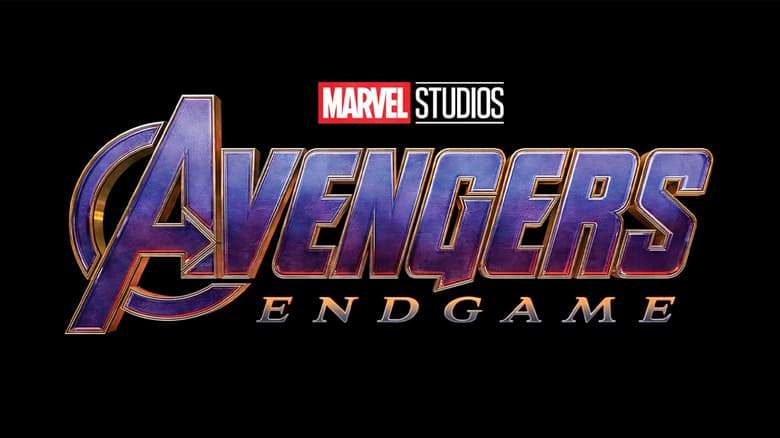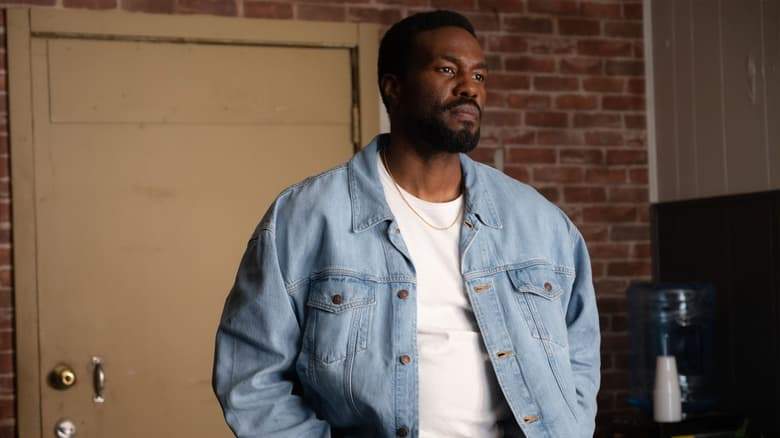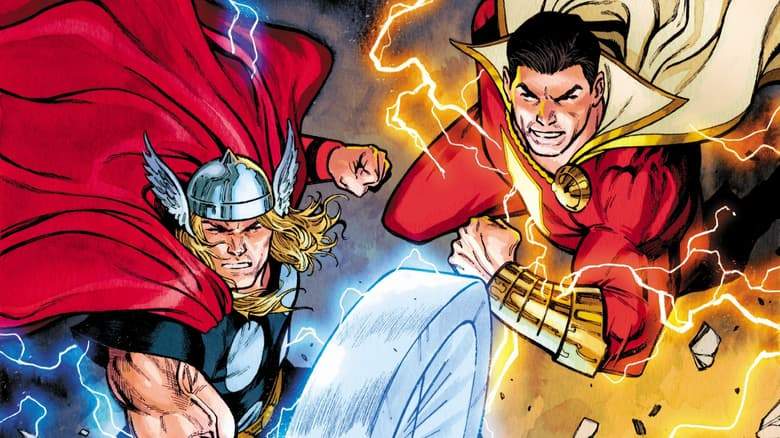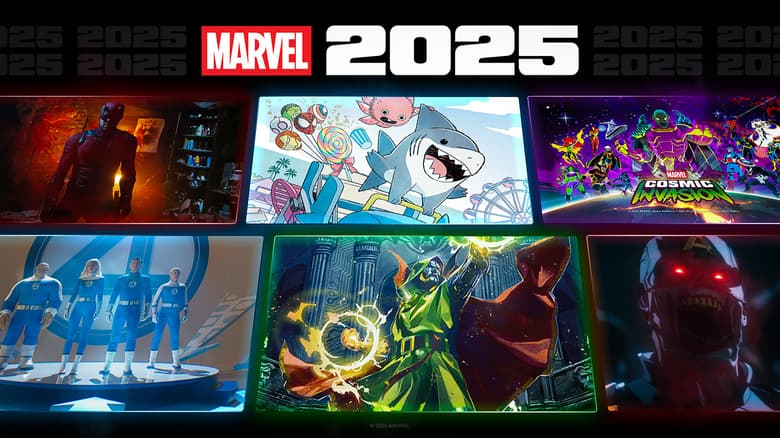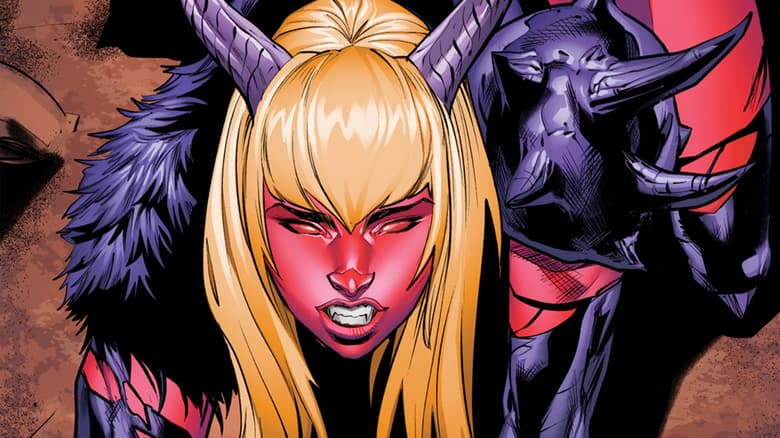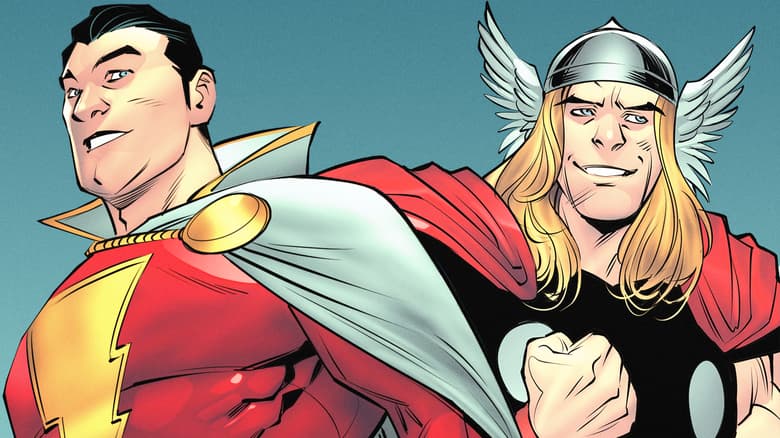Gwenpool Makes an Important Discovery in ‘Love Unlimited: Gwenpool’ #47
We spoke to the creative team behind Gwenpool’s ‘Love Unlimited’ arc about the character’s asexuality and embracing who she is at her core.
Face front, True Believers! The following interview contains spoilers for LOVE UNLIMITED: GWENPOOL #47, out now on the Marvel Unlimited app!
Catch up on Gwenpool’s complete story arc starting in LOVE UNLIMITED: GWENPOOL #43.
Gwenpool, Marvel’s katana-wielding and fourth wall-breaking antihero, gleefully leaps from one misadventure to the next. As a self-appointed narrator of Earth-616, Gwen seldom thinks twice before using her timeline-rewriting powers to reshape the world to her liking. Our no-pants-wearing mercenary tweaks events of the past, present, and future to tell the story she wants to tell. And, armed with an encyclopedic knowledge of comics, she bends all the rules and bucks comic conventions to gift audiences with thrilling and hilarious stories—regardless of the consequences.
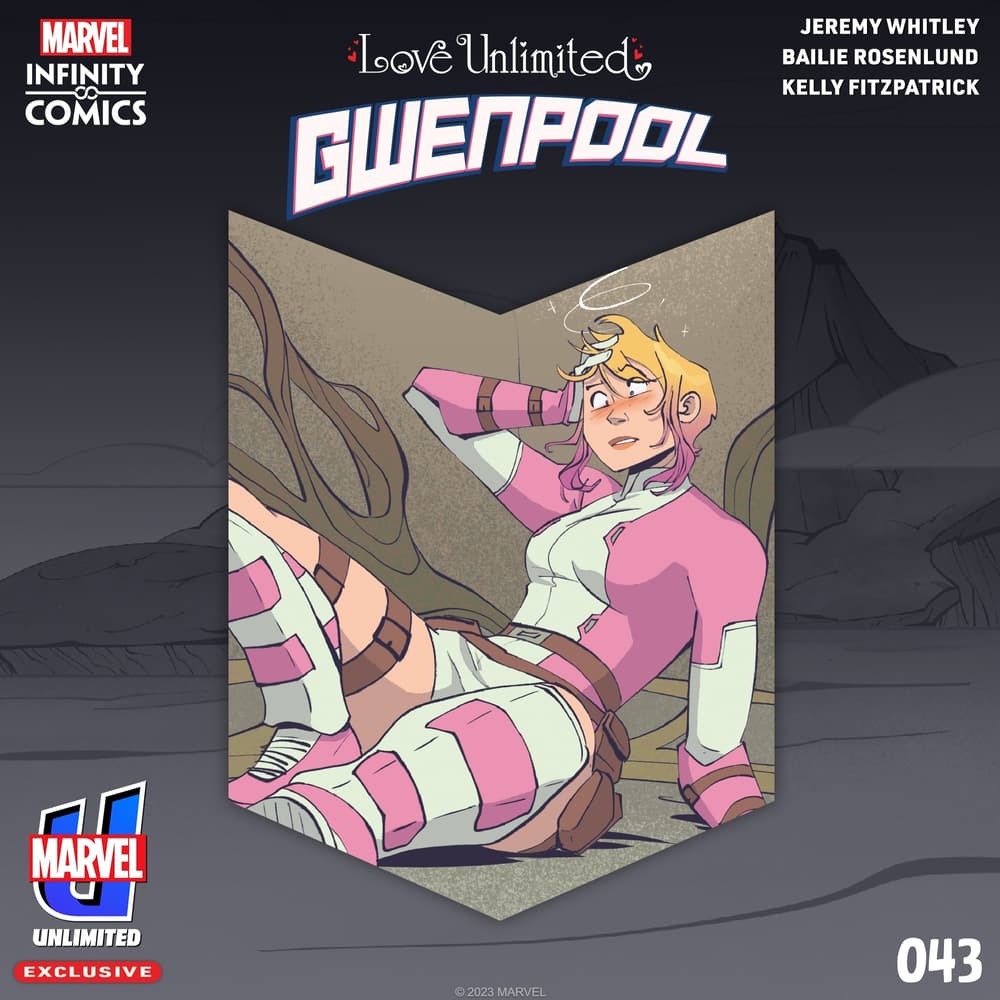
Releasing now across six parts on the Marvel Unlimited app, LOVE UNLIMITED: GWENPOOL is the latest story arc in the app’s exclusive romance anthology series, LOVE UNLIMITED. Told in the vertical Infinity Comics format, LOVE UNLIMITED: GWENPOOL #43 kicked things off with a dramatically staged meet-cute with mutant Wither, a messy love triangle involving Elixir, and now Gwen’s new (and perfect) relationship with original Power Pack member Julie Power. Gwen seems to have cracked this whole romance thing! So why does she still feel like she’s someone she isn’t?
[RELATED: Gwenpool Takes Center Stage in a Romance Comic]
In today’s LOVE UNLIMITED: GWENPOOL #47, Gwen comes face-to-face with the one piece of her own comic book continuity that she's been reluctant to face: her sexual and romantic identities. And, with the help of Julie, Gwen slowly starts to realize that romance might not actually be what she’s been looking for.
Ahead of issue #47’s reveal, we spoke to the acespec creative team of writer Jeremy Whitley, artist Bailie Rosenlund and color artist Kelly Fitzpatrick, and book editors Alanna Smith and Kaitlyn Lindtvedt about Gwen’s asexual and aromantic identity, plus how Gwen will find her place within the queer community in concluding chapter LOVE UNLIMITED: GWENPOOL #48.
The first thing I noticed about this comic was its vertical panel format. What was the most freeing part about crafting artwork outside a traditional panel layout?
BAILIE ROSENLUND: Most comic work I do is print/page formatted, so designing for [the] Infinity scroll definitely comes with its own unique challenges—which I find quite exciting. Paneling is controlling the passing of time. In a medium that is built to be experienced by scrolling on your phone, there are limitations, but you have a bit more control over how a reader experiences a moment. It’s like having a camera. But that camera can only pan vertically down. And Gwen [is in] control of the “camera,” and she’s guiding you along!
KELLY FITZPATRICK: When I started, Marvel provided me with a handy guide about formatting for the new way [Infinity Comics] were being laid out! That combined with Bailie’s art really informed my decision-making when it came to the colors. On a traditional comic page you have to think about how everything will flow from panel to panel: left to right, top to bottom. With this format, each panel is almost doing the work of the whole page, but you still need harmony between the panels with the color choices. It’s challenging but fun!
This “Love Unlimited” arc serves as Gwen’s origin story but also her origin love story. What made issue #47 the perfect place for that?
JEREMY WHITLEY: I think the real key with Gwen is often getting over herself more than anything else. She’s such a smart and well-read hero, that she won’t stop trying to force the tropes and literary devices she’s familiar with onto her life. I think to tell a good Gwenpool story, you have to start with Gwen trying to direct the story the way she thinks it ought to go, only for the story to refuse and redirect itself. We all try to do that in our own lives; for Gwen it’s just very literal.
I also think it’s no coincidence that it’s Julie that finally gets it out of her because Julie is a beloved childhood character for her. Even beyond their relationship, she finds Julie the character to be trustworthy and kind.
In the build-up issues, we’ve seen Gwen smash some romantic tropes like a love triangle or needing to be “saved” to fall in love. This issue takes a confessional turn. What was your first approach on handling this moment?
JEREMY WHITLEY: The important thing for me was that her own “origin story” was the story Gwen didn’t know how to tell. The ending had to feel off and unsatisfying for her. As a result, she goes out of her way to “story” it up. The “guest appearance” from Spider-Man isn’t just Gwen being zany, it’s [giving] herself permission to tell the story.

My favorite moment in this issue is how Gwen uses her hands to describe her discomfort with kissing. How did you land on that imagery to express such a complicated emotion?
BAILIE ROSENLUND: That’s one of my favorite sequences! Jeremy wrote in the script “Gwen mimes fighting between her index fingers,” and I think it lends itself well to this isolating and vulnerable moment. I actually sat and mimed the moment out myself just to make sure I got the hand poses just right. [Laughs] I really connected with Gwen throughout this whole story—especially in moments like this. As ace people, we can have some really complicated and confusing senses of personal boundaries when it comes to intimacy. There can be struggles between your own comfort versus what you think is expected of you (and the guilt that comes with that) which we see Gwen experience. I think it’s so important to show that because it’s not something we often see represented in the ace experience.
KELLY FITZPATRICK: [I knew] I wanted the peachy reds from the wall background to move into the yellow space. The colors clash and make you feel uneasy when you move immediately into the purples. I used purples to start hinting at her being on the ace spectrum in those scenes, in tandem with pink since it’s a color of passion, as well as the colors of the sapphic flag. I love that color can play with the subconscious mind to tell stories.
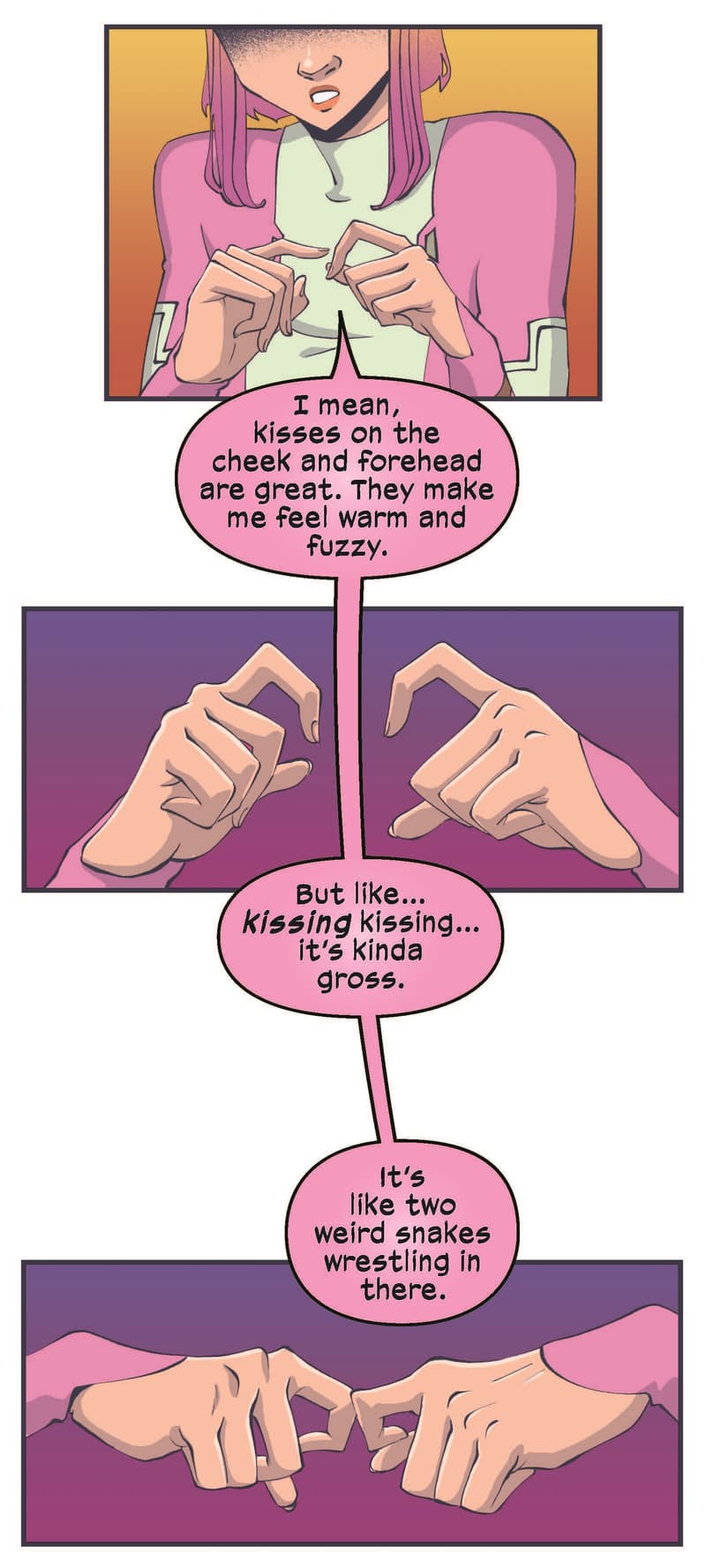
Julie teaches Gwen that there’s no shame in wanting to have your needs met and admitting when someone can’t. I have to know why it felt right to have Julie—who has had a lot of heartache!—share this advice.
JEREMY WHITLEY: I think, especially with queer characters, there’s this tendency to put relationships up on a pedestal. Once you’ve found a person you care about, you do whatever you have to do to preserve that romantic relationship. While it’s an understandable impulse, it’s ultimately an unhealthy one. Denying what you actually want and need is poisonous to any relationship.
Julie is a character who has had to find her own path and it has been a winding one—from Power Pack to Avengers Academy to Runaways to Future Foundation. Julie’s had a lot of loss and a few painful breakups. She realizes now the importance of asking for what you need. And, ultimately, recognizing the things you want and don’t want in a relationship is extremely important. For Gwen, that relationship doesn’t include sex. For Julie, it absolutely does. Nobody should be made to feel bad about what they need. It’s okay to value your own happiness above continuing to feed a relationship that’s not fulfilling you.
BAILIE ROSENLUND: Reading this part of the script the first time, I had to take a moment; I was like “damn Jeremy, this is too real.” [Laughs] Many of us—ace or not—have had to have difficult and vulnerable conversations with the people in our lives. It’s never very fun—but it builds a stronger relationship and understanding of yourself.
KELLY FITZPATRICK: I feel so lucky to have been a part of this entirely acespec team and story. I literally cried when I got to this part of the script. Jeremy is so right in stating that “nobody should be made to feel bad about what they need.” Acespec people aren’t often shown in media and when they are, it’s often shown as a trope of being a broken thing that needs fixing. The more diversity and stories we can tell, the better.
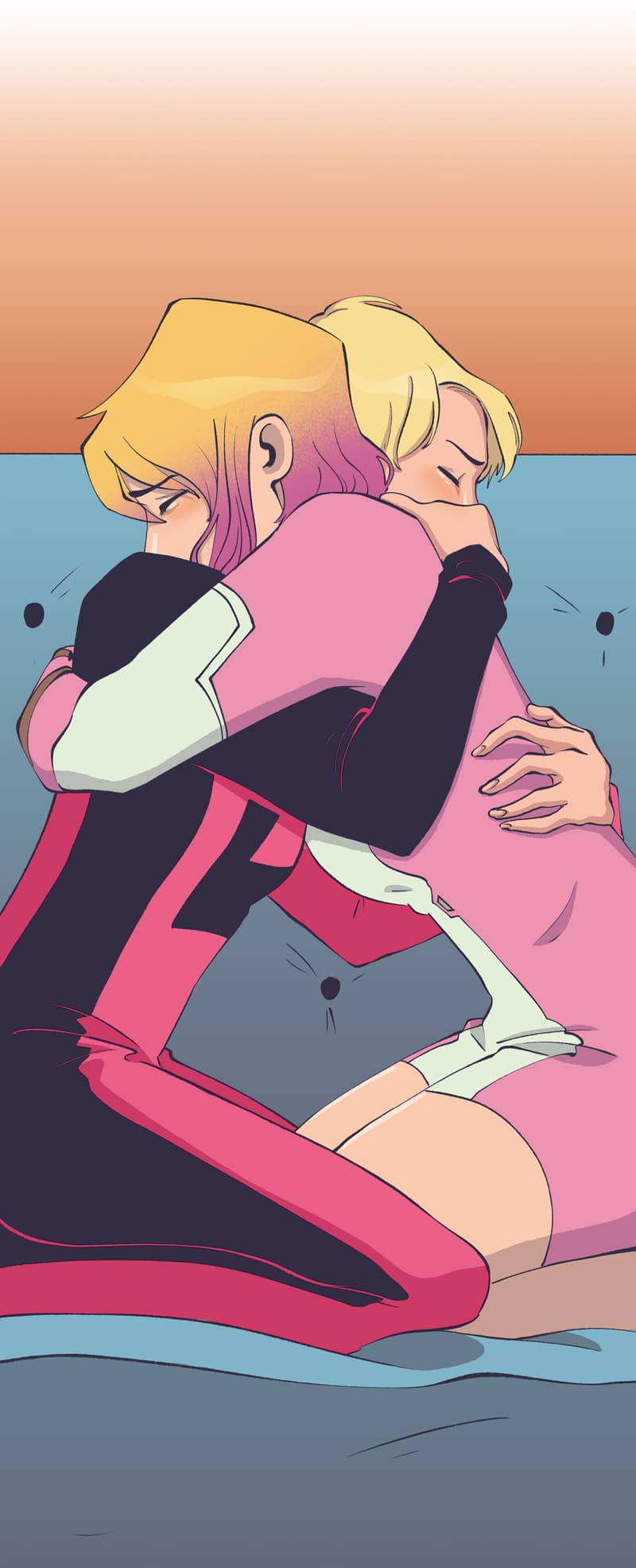
I’m curious if there are aspects to Gwen’s romantic discovery that you hope other readers pick up on, like the importance of consent.
JEREMY WHITLEY: Absolutely. It’s important to make it plain what you need from a relationship and share that with your partner.
But I hope the biggest takeaway is that your love life doesn’t have to conform to tropes and existing ideas about what a romance looks like. Gwen tries these things and all she does is hurt people—including herself. I think this becomes clearer in the second half of the story; that it’s not about using people or “staying relevant.” This is about Gwen trying to force herself to be something she isn’t through the only methods she knows how—the ones she learned from comics.
KELLY FITZPATRICK: I wish I were in Gwen’s shoes, in a way, despite the heartache she and Julie are going through. Julie listens to her, accepts her for who she is, and then takes her to a place that could further her access to a queer community. I wish I would have had that in my early 20s. I think it’s amazing what the internet and activists before me have done for the queer and ace communities. AVEN was founded in 2001 and I didn’t find out about it or asexuality until around 2007. I feel so grateful to those message boards and everyone who poured out their stories about their lives, their failed relationships, their working relationships, and how they landed on the ace spectrum. Finding out there was a word for my sexuality, as well as having the language to communicate my needs for my future relationships, was an essential part of being able to talk to my partners about consent. If there’s one thing I’ve learned in life, you can’t be something you aren’t.
Alanna, Kaitlyn, for a comic that loves to take playful jabs at editors, I had to wonder: Would a comic version of either of you ever appear on the page? If it did, what message would you give Gwen?
ALANNA SMITH: Unfortunately, I think Gwen’s the type of person who doesn’t really take advice on board until she learns things the hard way. So maybe I’d just give her some fun acespec book recs like Little Thieves by Margaret Owen and Aces Wild by Amanda DeWitt and send her on her journey.
KAITLYN LINDTVEDT: Ha! Gwen is so thoroughly the kind of character who needs to figure things out for herself that I’m not sure she’d listen to my advice even if I did appear on the page. But mostly what I want for Gwen is for her to figure out how to love and choose herself, and I think the way she’s been stumbling through that learning process will resonate with a lot of people.
Issue #47 starts to flesh out what it means to identify on the ace spectrum. When editing this title, what did you feel was most important to highlight?
ALANNA SMITH: As someone on the ace spectrum myself, it was really important that we give Gwen the catharsis of encountering asexuality for the first time. Gwen compares herself to a space alien, and that’s often how I felt—that everyone else was “normal” and I was the weirdo who couldn’t make sense of the (very allosexual) world I was living in. One factor that led us to pick Gwen for this story was that out-of-place feeling that’s always been at the core of her character. We wanted to pose the question: is part of that because she’s ace, and doesn’t have the language to express that yet? And a key to exploring that was to recruit an all-acespec creative team. We were all pulling in the same direction to tell a deeply personal story. Gwen’s experience won’t reflect the experience of every person on the spectrum, but because this story came from such an authentic place, I think a lot of people will find pieces of it that they relate to.
KAITLYN LINDTVEDT: We wanted to show that there are so many different ways to be ace; that exploring and defining asexuality can be super confusing at first because of all the unlearning that has to happen around what it means to be in partnership with others; the kind of euphoria that comes with giving yourself permission to settle into the label(s) that feel good for you. Ace spectrum representation is still in its growth period, really, so it was important to the entire creative team, not just the editors, that our discussion of it be as encompassing as possible within the space we had.
Read LOVE UNLIMITED: GWENPOOL now, only on the Marvel Unlimited app. Sign up today to get your first year for $60.
The Daily Bugle
Can’t-miss news and updates from across the Marvel Universe!
